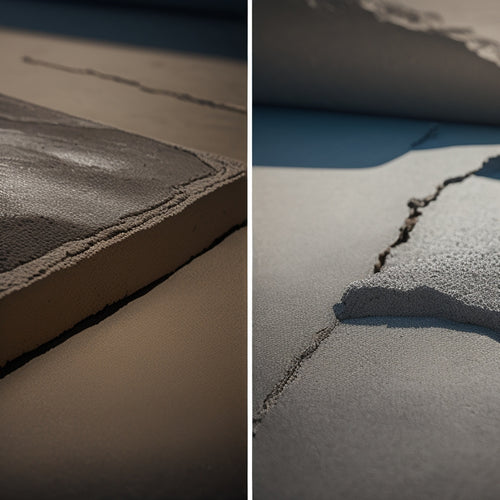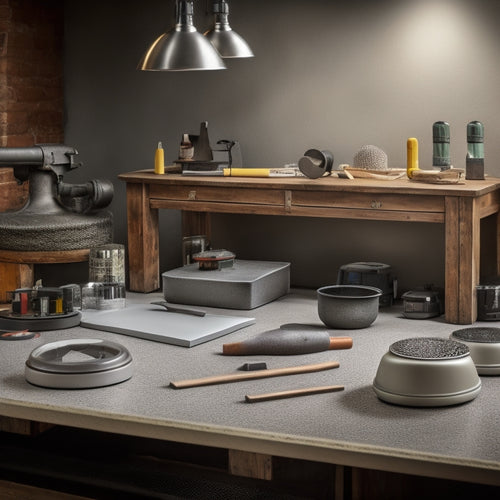
What Tools Measure Concrete Block Thickness Accurately
Share
When measuring concrete block thickness, you can rely on a range of tools that provide accurate readings. Precision measurement devices like calipers, digital thickness gauges, and high-accuracy micrometers offer precise measurements. Non-destructive testing methods, such as ultrasonic thickness testers and block thickness scanners, guarantee the integrity of the block remains intact during testing. Additionally, innovative solutions like laser distance measurers and advanced block inspection devices provide quick and accurate measurements. By selecting the right tool for your project, you can guarantee accurate thickness measurements and maintain the quality of your construction project - and there's more to explore to guarantee you make the most informed decision.
Key Takeaways
• Calipers, including dial, digital, and vernier types, provide precise concrete block thickness measurements with an accuracy range of 0.01 mm to 0.1 mm.
• High-accuracy micrometers offer measurements in the micron range, ideal for precise tolerances, but require regular calibration against certified standards.
• Digital thickness gauges provide fast and accurate readings with a simple button push, featuring high-resolution displays and durable construction.
• Ultrasonic thickness testers use high-frequency sound waves to provide accurate depth readings with an accuracy of ±0.1 mm, ideal for quality control.
• Laser distance measurers offer a non-contact method for precise thickness measurement, requiring regular distance calibration to maintain accuracy.
Calipers for Precise Measurements
When measuring concrete block thickness, how accurately can you rely on your measurements without a precise tool like calipers? Without calipers, you're likely to encounter inconsistencies and inaccuracies. Calipers, on the other hand, offer precise measurements, guaranteeing you get accurate readings.
There are various caliper types, including dial calipers, digital calipers, and vernier calipers, each with its own strengths and weaknesses. For concrete block thickness measurement, you'll want to opt for a caliper with a high level of precision, typically in the range of 0.01 mm to 0.1 mm.
Measurement techniques also play an important role in achieving accurate results. You'll want to verify the caliper is properly zeroed and that the measuring faces are parallel to the concrete block surface. Additionally, it's vital to take multiple readings at different points on the block to account for any variations in thickness.
Digital Thickness Gauges
Measuring concrete block thickness with digital thickness gauges offers a convenient and efficient alternative to calipers, providing fast and accurate readings with the push of a button.
You'll appreciate the digital measurement benefits, including reduced measurement variability and increased precision. These gauges typically feature a flat anvil and a precision sensor that measures the distance between the anvil and the block surface.
When comparing thickness gauges, look for models with high-resolution displays, durable constructions, and IP67 or higher ratings for protection against dust and water. Some digital thickness gauges also offer advanced features like data storage, statistical analysis, and USB connectivity for easy data transfer.
When selecting a digital thickness gauge, consider the measurement range, resolution, and accuracy you need for your specific application. By choosing the right gauge, you can guarantee accurate and reliable thickness measurements, streamlining your quality control process and improving overall productivity.
High-Accuracy Micrometers
You can achieve even higher precision with high-accuracy micrometers, which offer precise measurements in the micron range, making them ideal for applications that require exacting tolerances.
These micrometers are designed to provide reliable and accurate measurements, guaranteeing that your concrete block thickness meets the required specifications.
To guarantee the accuracy of your high-accuracy micrometer, it's vital to follow proper calibration procedures. This involves checking the micrometer against certified measurement standards to verify its accuracy.
Regular calibration is important to maintain the micrometer's precision and prevent errors in your measurements.
Here are some key considerations for using high-accuracy micrometers:
-
Micrometer calibration: Regularly calibrate your micrometer to guarantee accuracy and precision.
-
Measurement standards: Use certified measurement standards to verify the micrometer's accuracy.
-
Environmental control: Maintain a controlled environment to minimize temperature and humidity effects on the micrometer's accuracy.
Laser Distance Measers
For applications where high-accuracy micrometers may be impractical or inaccessible, laser distance measurers offer a reliable alternative for measuring concrete block thickness with precision.
You'll appreciate the ease of use and convenience these tools provide. To guarantee laser accuracy, it's crucial to perform distance calibration regularly.
This process involves adjusting the device to account for environmental factors, such as temperature and humidity, which can affect measurement readings. Once calibrated, laser distance measurers can provide accurate measurements with a high degree of precision.
When using these tools, you'll typically aim the laser at the concrete block and receive a digital reading of the distance. This non-contact method eliminates the risk of damaging the block or affecting its dimensions.
With laser distance measurers, you can quickly and efficiently measure concrete block thickness, making them an ideal solution for a range of applications, from construction to quality control.
Measuring Tapes for Blocks
Concrete block thickness can be accurately determined using measuring tapes specifically designed for blocks, which are typically made of fiberglass or steel and marked with clear, precise graduations. These tapes are designed to withstand the rigors of construction sites and provide reliable measurements.
When choosing a measuring tape for concrete block thickness, you'll want to take into account factors such as accuracy, durability, and ease of use.
Here are three key factors for measuring tape accuracy:
-
Graduation markings: Look for tapes with clear, precise markings that allow you to easily read measurements.
-
Tape material: Fiberglass tapes are more flexible and resistant to damage, while steel tapes are more durable and suitable for heavy-duty use.
-
Certification: Verify the tape meets industry standards for accuracy, such as those set by the National Institute of Standards and Technology (NIST).
When making tape measure comparisons, think about the specific needs of your project and choose a tape that meets those requirements. By selecting a high-quality measuring tape, you can guarantee accurate concrete block thickness measurements and avoid costly errors.
Ultrasonic Thickness Testers
When you use ultrasonic thickness testers to measure concrete block thickness, you'll appreciate the accurate depth readings they provide.
These testers employ a non-destructive inspection method, which means you won't damage the block or its surrounding structure.
Accurate Depth Readings
Using ultrasonic thickness testers, you can quickly obtain accurate depth readings of concrete blocks by measuring the time it takes for high-frequency sound waves to bounce back from the block's surface and internal layers. This non-invasive technique is particularly useful when you need to verify block thickness standards without damaging the material.
Here are three key benefits of using ultrasonic thickness testers for accurate depth readings:
-
High accuracy: Ultrasonic thickness testers can provide depth measurements with an accuracy of ±0.1 mm, making them ideal for quality control and inspection applications.
-
Fast measurement: The testing process is rapid, allowing you to quickly scan multiple blocks and obtain accurate readings in a short amount of time.
-
Non-destructive testing: Unlike other depth measurement techniques, ultrasonic testing doesn't damage the concrete block, making it an ideal solution for evaluating block thickness standards without compromising the material's integrity.
Non-Destructive Inspection Method
You can rely on ultrasonic thickness testers to provide a non-destructive inspection method for measuring concrete block thickness, ensuring the material's integrity remains uncompromised throughout the testing process. These devices use high-frequency sound waves to measure the thickness of concrete blocks without causing any damage.
The process is straightforward: you'll apply a couplant to the surface of the block, place the probe on the surface, and the device will display the thickness reading.
Ultrasonic thickness testers are particularly useful when you need to inspect concrete blocks without damaging them. They're also ideal for measuring thickness in hard-to-reach areas or when you need to inspect a large number of blocks quickly.
In addition to ultrasonic testing, other non-destructive inspection methods, such as infrared thermography and acoustic emission, can be used to evaluate concrete block thickness. However, ultrasonic testing is often the most convenient and cost-effective option.
With an ultrasonic thickness tester, you can quickly and accurately measure concrete block thickness, ensuring that your construction project meets the required specifications.
Block Thickness Scanners
Block thickness scanners employ non-destructive testing methods to accurately determine the thickness of concrete blocks, providing precise measurements without compromising the integrity of the material. These scanners are particularly useful when you need to assess the block density and material composition without damaging the sample.
When using block thickness scanners, you'll appreciate their ability to provide detailed information about the internal structure of the concrete blocks.
Here are three key benefits of using these scanners:
-
Accurate measurements: Block thickness scanners can detect even slight variations in thickness, ensuring that you have precise data to work with.
-
Material analysis: These scanners can analyze the material composition of the concrete blocks, helping you identify potential issues or defects.
-
Non-invasive testing: Because block thickness scanners use non-destructive testing methods, you can test the blocks without causing any damage or altering their structure.
Precision Rulers for Masonry
When you're measuring concrete block thickness, you'll need a precision ruler that can accurately capture block dimensions.
You'll want to choose a ruler that's specifically designed for masonry, as it will provide the level of precision you need to guarantee accurate measurements.
Measuring Block Dimensions
Accurate measurements of a concrete block's length, width, and height are essential in masonry construction, and precision rulers specifically designed for this purpose facilitate these measurements.
As you measure block dimensions, you guarantee that your structure is built to last, with minimal errors and maximum stability. Inaccurate measurements can lead to structural weaknesses, costly rework, and even safety hazards.
To achieve accurate measurements, you'll want to employ effective block dimensioning techniques. Here are three key considerations:
-
Calibrate your ruler: Verify your precision ruler is calibrated to the correct units of measurement, whether it's inches, feet, or meters.
-
Measure multiple times: Take multiple measurements of each block dimension to account for any variations or irregularities.
-
Use the correct unit of measurement: Confirm that your measurements are in the correct unit of measurement to avoid conversion errors.
Ruler Accuracy Matters
You guarantee reliable measurements by selecting a precision ruler specifically designed for masonry, as it provides a high level of accuracy and consistency in reading concrete block dimensions.
When it comes to ruler types, you'll find that digital calipers and precision steel rules are ideal for masonry applications. These rulers offer precise measurements in various units, including inches, millimeters, and centimeters.
Digital calipers, in particular, provide exact readings with high accuracy, usually up to 0.001 inches or 0.01 millimeters. They're also convenient to use, allowing you to switch between measurement units seamlessly.
Precision steel rules, on the other hand, offer a more traditional approach to measurement, with precise markings and graduations that enable accurate readings.
When choosing a ruler for masonry, consider the level of precision you need. If you're working with smaller blocks or require extremely accurate measurements, a digital caliper might be the better option.
For larger blocks or more general measurements, a precision steel rule could suffice. Regardless of the ruler type, make certain it's specifically designed for masonry to assure reliable and consistent measurements.
Non-Destructive Testing Tools
Ultrasound equipment and radiometric devices are commonly used non-destructive testing tools to measure concrete block thickness without damaging the material. These tools are essential when you need to determine the thickness of a concrete block without compromising its integrity. Non-destructive testing tools are particularly useful when working with existing structures or when you can't afford to damage the material.
You can rely on non-destructive testing tools to provide accurate measurements using:
-
Ultrasonic technology: This method uses high-frequency sound waves to measure the thickness of concrete blocks. It's a non-invasive method that's quick and easy to use.
-
Radiometric devices: These devices use gamma rays or X-rays to measure the thickness of concrete blocks. They're commonly used in industrial settings and provide highly accurate results.
-
Acoustic resonance testing: This method uses sound waves to measure the thickness of concrete blocks. It's a non-invasive method that's gaining popularity in the construction industry.
Advanced Block Inspection Devices
Building on the capabilities of non-destructive testing tools, advanced block inspection devices offer enhanced features and higher precision for measuring concrete block thickness. These devices utilize advanced inspection techniques, providing you with more accurate results and a deeper understanding of the concrete block's internal structure.
For instance, some advanced block inspection devices employ electromagnetic pulse technology, which can detect even the slightest variations in concrete density. This allows you to identify potential defects or weaknesses in the block, guaranteeing that your construction project meets the highest standards of quality and safety.
When it comes to measuring concrete block thickness, you need innovative measurement solutions that can deliver precise results quickly and efficiently. Advanced block inspection devices are designed to do just that, providing you with fast and accurate measurements that can be used to inform your construction decisions.
With their enhanced features and advanced inspection techniques, these devices are ideal for construction professionals who require precise thickness measurements to guarantee the integrity of their structures. By investing in an advanced block inspection device, you can confidently measure concrete block thickness and guarantee that your construction projects meet the highest standards of quality and safety.
Frequently Asked Questions
Can Concrete Block Thickness Vary Depending on the Manufacturer?
You'll find that concrete block thickness can indeed vary depending on the manufacturer.
It's crucial to check the manufacturer's specifications, as they may differ from industry standards.
While industry standards provide general guidelines, manufacturers may have their own unique requirements.
For instance, some may produce blocks with a specific thickness to meet local building codes or cater to specific applications.
Always consult the manufacturer's specs to guarantee you're getting the right block for your project.
Are There Specific Tools for Measuring Curved or Angled Blocks?
Imagine maneuvering through a complex landscape of curved and angled blocks, where precision is key.
You'll need specialized tools to tackle block curvature measurement.
For instance, you can employ a flexible curve ruler or a digital angle finder to measure those tricky angled blocks.
These angled block tools will help you achieve accurate readings, ensuring your project's integrity.
How Often Should Concrete Block Measurement Tools Be Calibrated?
You should calibrate your concrete block measurement tools regularly to guarantee measurement accuracy.
The calibration frequency depends on usage and environmental factors. If you use the tools daily, calibrate them every 3-6 months. For less frequent use, calibration every 6-12 months is sufficient.
Failing to calibrate can lead to inaccurate readings, affecting your project's quality.
Always refer to the manufacturer's guidelines for specific calibration recommendations to maintain ideal measurement accuracy.
Can Weather Conditions Affect Concrete Block Thickness Measurements?
You're right to wonder if weather conditions can affect concrete block thickness measurements.
Temperature effects and humidity impact can indeed influence the accuracy of your readings. High temperatures can cause concrete to expand, while low temperatures can cause it to contract.
Similarly, high humidity can lead to swelling, while dry conditions can cause shrinkage.
To guarantee precise measurements, it's crucial to take into account these environmental factors and take necessary precautions to minimize their impact.
Are There Tools That Measure Concrete Block Thickness and Density Simultaneously?
You're dealing with a mountain of concrete blocks, and you need to know their thickness and density ASAP!
Fortunately, you have tools that can measure both simultaneously. Ultrasonic testing devices use high-frequency sound waves to determine thickness and density with incredible accuracy.
Additionally, density gauges utilize gamma radiation or electrical impedance to measure density while simultaneously calculating thickness.
These tools are a game-changer, providing you with precise data to guarantee your construction project is on solid ground.
Conclusion
You've explored the various tools that accurately measure concrete block thickness. From calipers to advanced block inspection devices, each tool offers unique benefits.
Did you know that, according to the American Society for Testing and Materials (ASTM), even a 1/8 inch deviation in block thickness can affect a structure's load-carrying capacity by up to 10%?
With the right tool, you can guarantee precise measurements and a stronger build.
Related Posts
-

3 Best Hand Tools for DIY Concrete Construction
When tackling a DIY concrete construction project, you'll need three essential hand tools to achieve a professional-l...
-

What Tools Ensure Strong Concrete Adhesion at Home
You'll need the right tools to guarantee strong concrete adhesion at home. For surface preparation, use concrete surf...
-

10 Best Tools for Sealed Concrete Finishing Success
When it comes to sealed concrete finishing success, you need a robust arsenal of specialized tools. Start with essent...


